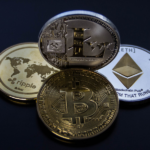Everscale (EVER) is a fast and secure first-tier blockchain that can handle millions of transactions per second. Everscale is the equivalent of a virtual supercomputer, a feature similar to other level one blockchains like Ethereum. It emerged from the creation of Telegram Open Network (TON), a decentralized ecosystem focused on instant messaging (Telegram), data storage, and other decentralized applications.
The Everscale blockchain is a partitioned blockchain with up to 232 chains processing transactions.
Its masterchain records general information and parameter values from other working blockchains, the so-called workchains. Workchains are used for processing transactions and executing smart contracts, and can host different tokens. The workchains themselves are again divided into up to 260 sharded blockchains, the so-called shardchains, which host part of the workload from their assigned workchain. This allows Everscale to scale up to its promised high throughput and create up to 232 tokens, one for each partitioned blockchain.
Table of Contents:
How does Everscale work?
The sharded chain design already employed by Everscale is similar to the one Ethereum is currently building towards. Everscale works as a proof-of-stake chain divided into several partitioned chains to handle the load of potentially several million transactions per second. This architecture allows Everscale to far outperform current market-leading chains since no single blockchain can process so many transactions at once.
Everscale’s blockchain architecture is divided into three main components:
- The masterchain.
- The workchains.
- The shardchain chains.
The masterchain contains general information about the entire network and records the values coming from the workchains. Up to 232 workchains record transactions if tokens are sent or smart contracts executed. Not all workchains are created equal. For example, different chains may have different account address formats, different virtual machines, and different transaction formats. Multiple workchains are triggered based on network load. For example, if there is a high load of transactions, more workchains will process them.
Up to 260 shardchains are responsible for a subset of accounts and handle a portion of transactions from the workchains. In case you need to replace an incorrect block in the partition chain, you can add a new block to the horizontal chain, containing the necessary adjustments. In this unique Everscale mechanism, invalid blocks in shardchains can be replaced without forking all shardchains and unnecessarily slowing down the network.
This blockchain architecture enables the purpose of Everscale’s sub-second transaction. In addition, Everscale allows you to write in Solidity and C++, and up to 232 different tokens can be created. Its standard custom TIP-3 token allows the use of network features, such as decentralized finance (DeFi) and NFTs.
Individuals can start using Everscale by acquiring EVER tokens that can be stored in desktop, mobile, or web wallets and purchased from different centralized and decentralized exchanges. In addition, users can bridge to and from Everscale using one of the recommended bridges such as Octus Bridge. Everscale currently offers a major decentralized exchange (DEX) in FlatQube, which has yield farming, token exchanges, and staking opportunities.
Unique features of Everscale
Everscale has several promising features that emphasize its unique capabilities.
Partitioned Blockchain Design
With its workchain and shardchain architecture, Everscale takes a different approach from all current leaders in the blockchain space. Everscale therefore lends itself to use cases such as processing transactions on an institutional scale, such as for credit card companies. In short, Everscale could be described as the blockchain that Ethereum is trying to become.
High throughput and fast transaction intent
The high throughput and purpose of transactions below the second of Everscale make the blockchain incredibly user-friendly. Unlike chains like Bitcoin and Ethereum, which require users to wait minutes for their transfer to be processed, transfers on Everscale are settled virtually instantly. Particularly in terms of potential use cases such as DeFi and NFT, Everscale boasts a significant advantage over its rivals.
Variety of use cases
Although the DeFi and NFT ecosystems on Everscale are still relatively small to other chains, there are already several platforms available. FlatQube is the chain’s leading DEX and Crypto Waifus and TON Punks are the first NFT collections on Everscale. As usage increases, these are set to grow further in the near future.
Everscale Tokenomics |
The EVER token is the native token of the Everscale blockchain and is used to:
- Staking
- Yield farming and liquidity provision on DeFi protocols
- Governance and voting in the DAO community
- Transaction fees such as token swaps and token bridging
- Payments in decentralized applications
EVER is an inflationary token with a fixed bid rate. Every month, two million new EVER tokens are issued as validator rewards until EVER reaches a limit of five billion tokens. EVER’s current circulating offering is $1.23 billion. The initial distribution of EVER tokens was as follows:
- Reference treasury (85%): funds for partnerships and adoption initiatives.
- Developer Treasury (10%): Rewards for community developers who build projects and contribute to the Everscale ecosystem.
- Validator Treasury (5%): funds to initiate validator adoption and network security.


